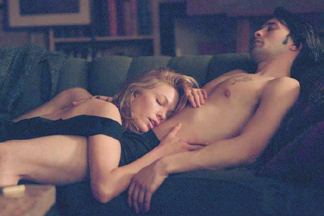A Question of Faith
Unfaithful true to director's formula
By Rachel Deahl

As per usual, women have affairs with Euros that have heavy accents. This time he’s French.
Gotta love clichés.
Adrian Lyne is somewhat like a low-grade porn director who fashions himself an auteur. Aside from Jacob's Ladder, Lyne has built a career making cheap sexual thrillers masked as thought-provoking dramas. In particularly unusual fashion, Lyne has managed to infuse rote tales of sexual obsession with an ambitious visual style. The director's unfortunate tendency to dress up his contextually vacant films as works of lofty artistic endeavors was painfully apparent in films like Indecent Proposal and Lolita. Whether cutting between close-ups of a roulette wheel in motion and Demi Moore and Woody Harrelson having sex in a bed full of money in Indecent Proposal or lingering on Jeremy Irons' pained mug as he watches Dominique Swain lasciviously play in the sprinkler in Lolita, Lyne's sometimes effective imagery never betrays the fact that he ultimately has nothing to say. With both Indecent Proposal, Lolita, and now Unfaithful, the director refuses to plunge the depths of his subject matter and opts instead to infuse his film with a mix of lifeless sex scenes and long lingering shots of his characters deep in contemplation.
Unfaithful, about a well-to-do fortysomething couple living in an affluent suburb of Manhattan with a dog, a kid, and an SUV, chronicles what happens when their American dream is destroyed by an act of infidelity and then one of revenge. Richard Gere and Diane Lane star as Edward and Connie; he's a successful businessman with a strong bond to his family and she's a bored housewife. When Connie has an unexpected run-in with a gorgeous, young, French book-dealer named Paul Martel (Oliver Martinez), she falls prey to temptation, and begins a torrid affair with the stranger. What begins as a trespass becomes a kind of obsession as Connie becomes more and more involved with her lover. When Edward begins snooping around, his worst suspicions come to fruition and he ultimately commits an unthinkable act.
As for the two leads, Richard Gere stumbles through the film with an unfortunate dye job (the actor drops his usual grey mop for a blondish-brown one, seemingly to look younger) and a toneless physique; Gere is at his most pathetic and vulnerable when his shirt is off. Diane Lane, on the other hand, carries much of the film. Inexplicably relegated to the love interest role in crappy action films (Judge Dread, Murder at 1600) and awful comedies (Indian Summer), the one thing to be thankful for with Unfaithful is Lane's presence.
Billed by Lyne as, "an erotic thriller about the body language of guilt," the director goes to painstaking lengths to infuse Unfaithful with an importance and sense of meaning it never achieves. Excessive amounts of celluloid are expended on Gere looking hurt and Lane looking tortured. And, if exploring the "body language of guilt" is even worthwhile, there must be a more provocative way to do it than this.
One of the more annoying elements of Adrian Lyne's cinema is the way he approaches his female characters. Often either objectified by men (Indecent Proposal, Lolita) or torturing them (Fatal Attraction and now Unfaithful), women always seem to be subjugated by their sexuality in Lyne's films. And, watching Unfaithful, you get the sense that one reason Lyne assumes this story is compelling is because the woman is the one doing the cheating. Does this mean that a story about a female adulterer is noteworthy because male adultery is commonplace? That certainly seems to be the unfortunate sentiment purveyed here.